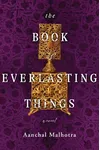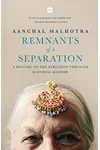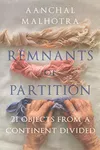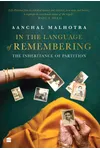Picture a New Delhi storyteller who turned heirlooms into portals of history—meet Aanchal Malhotra! This oral historian and writer has reshaped how we understand the India-Pakistan Partition, weaving personal stories with tangible memories. Born into a family of booksellers, Malhotra’s unique lens on South Asian history has made her a standout voice in literature and historiography.
With a knack for uncovering the emotional weight of objects like a grandmother’s shawl or a weathered yardstick, Malhotra captures the human side of the 1947 Partition. Her work blends art, history, and storytelling, inviting readers to explore a past that still echoes in the present.
The Making of Aanchal Malhotra
Born in 1990 in New Delhi, Aanchal Malhotra grew up surrounded by books, thanks to her family’s iconic Bahrisons Booksellers, founded by her grandfather Balraj Bahri in 1953. Art, not writing, was her first love—she earned a BFA in printmaking and art history from the Ontario College of Art & Design in Toronto, followed by an MFA from Concordia University in Montréal. Her artistic eye for detail and texture later shaped her approach to oral history. A sabbatical in 2013 sparked her fascination with Partition when she began recording family stories, uncovering objects that carried her grandparents’ memories from what is now Pakistan.
Aanchal Malhotra’s Unforgettable Stories
Malhotra’s debut, Remnants of a Separation: A History of the Partition through Material Memory (2017), began as her MFA thesis and became a critically acclaimed exploration of Partition. By focusing on objects—like a maang-tikka or a set of coins—carried by refugees, she reveals stories of loss, resilience, and identity. The book, published internationally as Remnants of Partition (2019), won the 2022 Council for Museum Anthropology Book Award and was praised for its innovative approach.
In 2022, Malhotra released In the Language of Remembering: The Inheritance of Partition, a 700-page collection of interviews with descendants of Partition survivors across India, Pakistan, and Bangladesh. This work dives into how trauma and memory ripple through generations, earning a spot on History Today’s Best Books of the Year. Her debut novel, The Book of Everlasting Things (2022), weaves a love story set against the Partition, blending her historian’s rigor with a novelist’s empathy. Malhotra’s style is intimate and evocative, using objects as gateways to explore belonging, displacement, and cultural heritage.
Beyond books, Malhotra co-founded the Museum of Material Memory in 2017, a digital repository of heirlooms and stories from the Indian subcontinent. This crowdsourced project invites people to share narratives tied to objects, preserving South Asian history in a borderless, accessible way.
Why Aanchal Malhotra Matters
Aanchal Malhotra’s work has transformed Partition studies by centering personal and feminist narratives, giving voice to survivors and their descendants. Her focus on material memory highlights how everyday objects carry profound histories, bridging divides between India, Pakistan, and Bangladesh. By amplifying stories often silenced in official accounts, she fosters empathy and understanding, making history feel alive and relevant. Her contributions to oral history and South Asian literature have earned her global recognition, from literary awards to speaking engagements at cultural festivals.
- Born: 1990, New Delhi, India
- Key Works: Remnants of a Separation (2017), In the Language of Remembering (2022), The Book of Everlasting Things (2022)
- Awards: Council for Museum Anthropology Book Award (2022), shortlisted for Sahitya Akademi Yuva Puraskar and British Academy Book Prize
- Notable Project: Co-founder of the Museum of Material Memory
Snag Remnants of a Separation or The Book of Everlasting Things and dive into Aanchal Malhotra’s captivating blend of history and heart!



